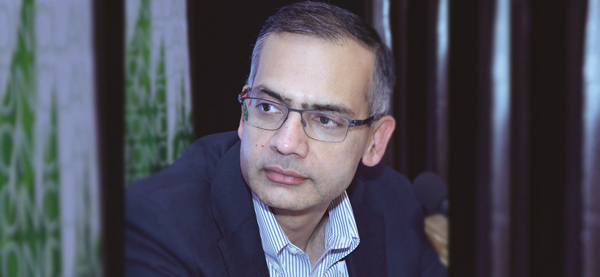Deep Kalra, Founder and CEO, MMT was at his candid best. In an exclusive one-on-one with Chetan Kapoor, Research Analyst, Phocuswright, he opened up on the big merger – which has taken the online marketplace by storm. While stocks have soared to record high, indicating that the financial world has taken to the merger, the larger challenge, to his understanding, is going to be ensuring the operational success in the coming months, a task more complicated than generally perceived.

FOUNDER AND CEO, MAKEMYTRIP
CK: How do you see the blending of both companies, cultures and supply-technology to begin with?
DK: You have gone for the jugular right away. The rationale behind this merger is fairly straight forward. It became painfully clear to me, and to some of my colleagues, too, that the heavy discounting war was going on for a long period of time. It does not happen too much on the airlines side, because airlines are very specific that you cannot discount their product which is a good thing. I like that. I like to play fair and square, because we have seen the gain in those kinds of markets.
In the hotel space, you take away chains like The Taj and others, who are also equally particular about their pricing, and they should be as they are great brands and they do not want their brand to be diluted, but only 10% of the hotel inventory in the country is chains which are established. There are newer chains coming up, which I am sure we will talk about. The rest of the inventory in the country, thankfully for us, is actually very fragmented, and is individual and independent properties. Now, those are the places where OTAs like us can add a lot of value, and I do not think that most of these properties are really bothered about whether you are discounting or not, so long as you are doing it from your own pocket. They want to see their rooms get filled.
It became painfully clear that this discounting was not going to stop. We were not the first aggressor. We never discounted, actually, in airfares. We have built a decent market share; we are 17% of the domestic market as MakeMyTrip alone, of everyone flying. Flights works quite smoothly. It has an easy interface. Everything works well, because airlines are high-tech.
When it comes to hotels, the price war was started largely by GoIbibo. They played to their advantage – which is they had very deep pockets and they were private. They were 100% owned by Naspers and Tencent, together. When you are private, you are not really answerable to the market on a quarterly basis. So, you can do whatever you think is right, and we are seeing this in every segment. People say they only see this on the internet and they say it is not fair. I say, even though, we are not doing it, all is fair in love and war. And this is war. Whether it is corporate war or whatever. You are not doing anything illegal. You have got the money and you are doing it. What is the difference between this and what Jio is doing right now. You talk to Airtel and the painful statement that Gopal Vittal put out recently, he said please put your money in Fixed Deposit, instead of putting your money in Telecom right now. You will get 1% return on capital. That is what it is right now. It has become so hard. Of course, they have made money in the past, but the reality is that Jio is playing with financial muscle. And, they spent somewhere around, people say, 10 billion dollars, or 15 billion on capex. They are saying that they are going to exercise that muscle.
I can tell you that no other market in the world, except India and Japan where a public company CEO can go ahead and bet the bank. Literally! And no one will ask a question. It is only here. You cannot do that in North America. You cannot do that in Europe. People ask a hundred questions. Why are you doing this? Again, that is the way this game is played. So, once it became clear, and I did validate it that these guys were not giving up – and we competed. I think after three quarters, and for three quarters we did not discount at all. We said we are not discounting on hotels; we are not discounting on our profits. We have got to go, and we are answerable to the market; we are on path to profitability; we had made 10 million dollars in 2012. Kingfisher pushed us back in the red. We had come out, breaking even on a quarterly basis. I was stuck to that path, but the market did not like it. MMT is listed in the US on NASDAQ; they did not like it. They said your hotel pre-eminent position is being challenged. I am being very frank on this because it is quite interesting to unravel all of this. We said we are way ahead in the airlines space, but the reality is that hotel is where the game is, in our OTA space. The most valuable OTA in the world is the group called PRICELINE which owns Booking.com, Agoda and others. They only sell hotel rooms effectively. One metasearch company called Kayak is worth 85 billion dollars. Expedia is not even 20 billion now. People do not know that. So, it is a big gap. CTRIP is worth 25 billion dollars which is in China, and has a very similar model like ours which is multi-service.
We decided to compete and we bled for the next 3-4 quarters. We spent a lot of money. We raised 180 million dollars from CTRIP last January. It is a lot of money, almost 1000 crores. We started spending that, but it was going nowhere. It was painful. We said you cannot build a great business like this. We want to solve customer’s issues. We want people to come to us not because we are the cheapest, but we want them to come to us again and again, because we are most reliable, we are the best and because they have a good experience with us. That is how great brands are built. But when someone is discounting 80 cents to a dollar, by 20-30%, people change their preferences. That is the reality of life. In travel space, they say, the three most important things are price, price, and price. They know we are selling someone else’s product, except for the holiday package that we put together. When people get the same deal at a cheaper rate, your most loyal customer move, and that was painful. So, finally we said let us try to project and look out for the next 2-3 years to understand how it is going to look out. I did have a chat with the CEO of Naspers, and it did not really go anywhere. Then, I think, fate has a way as well. We were lumped together, all the OTAs, in the infamous service tax case. I was meeting Ashish of GoIbibo in court, and at least that is one area you are on the same side for something.
It took a long time, but by October we stitched a deal. Finally, we had a deal where we got a 100% of GoIbibo, 100% of RedBus, close to 100 million dollars from them to balance of the cash on the balance sheet. In return, they got 40% of MMT – which is, obviously, very precious. The market has given it big thumbs up. It is 3 billion dollars plus now. We do not get carried away with market cap, but I am just saying from a financial point of view that we have got a thumbs up. We have got to make it work from an operational point of view. That is the real challenge. It has been two months since we have got the approval.
CK: What are some of the early steps that you have taken as part of your integration?
DK: I underestimated some of the challenges pertaining to mergers and acquisitions. It is not easy. It is very tricky, especially when you want to retain people. For every individual, no matter what level he or she is at, their universe is in them. They do not get the other mumbo-jumbo, except for some very senior people who get the big picture.
We get that and that is why we got professional help. We have got an ex-partner at McKenzie. She is helping us with the process.
My point was that I needed to align everyone to the bigger picture, and the bigger picture here was what can we do together. Why is this merger important for them? For Naspers, it is great. For my shareholders, too, it is great. the value has gone up by three times. But why does it matter to the individual. I tried to get into their shoes. It is not the same why it matters to me as a shareholder; why it matters to those who have a good amount of stock, so we have 350-400 people who have some stock in the company. That part helps, but that only helps till your stock is doing well. After a while, they get very savvy about it. They say, that is done, but a thinking professional does not come to work because how much they are earning. I do not think so. I think it is a by-product. We come to work because we enjoy it.
So, it had to be exciting. I spent a lot of time with Ashish and Rajesh, painting a bigger picture, a bigger canvas of what we can do together. Why should not we become larger, global, even put a market cap to it. Whatever! And I said I am going to really immerse everyone into this. So, I spent a good couple of hours painting a picture of what we can do together, because now we are not fighting that daily street fight; we are not spending all our energies and all our money in the daily street fights and battles with our competitors. So, let us build something which is special. Let us build products that have not been seen anywhere else in the world. Let us not fall in the trap of copying. Let us not talk about Artificial Intelligence (AI), let us do AI. Let us do incredible personalisation, so that everyone who comes to us will see a different interface on the basis of what you have done in the past. All of these things, interesting stuff are in the works. If you have done anything with us, even if it is one click, forget purchase, I know something about you and you have a mobile app, I know where you are. I know what you have done; what you are interested in, and why should I serve you the same interface as someone else.
Anyways, we got people aligned. We agreed on a set of projects that are interesting for us, but said that 18 people will not be enough. So, we invited the next 200 people and we have got them involved with real projects, not theoretical. The brief I gave was what would you do in this team if you did not have to fight your competitor day in and day out. What would you do to build something special for 2020 when you have all the resources, as we had all the money. I said, let us think about that make company cross-functional teams.
I am very aware of the fact that everyone will not be there. I told the leaders that I will be pleasantly shocked if all 18 of us are in the room after one year. Some of them will check out and I wanted them to know that it was perfectly ok. Company is larger than an individual, but you will be wishing away a great opportunity. You are secure. So, address the security issue. There is no insecurity and each one of you is in the company. Then we identified top 100 people from each company and ringfenced them, or handcuffed them, whatever you want to call it. Provided them more stock option, etc. And we have been very open about it. Now, let us build something special. Then I said do not get caught up with one thing that is what happens to my job title and who do I report to. Something has to change. I started from the top. Except me, everyone was going through some change in title; both Ashish and Rajesh are giving up their fiefdoms. Both were running their companies, and now they are going to have a narrower, but deeper, double brand.
So, I think it is working well but it is very early days. Time will tell. The proof of the pudding is in the eating. I think the tricky part will come when the headiness goes away. It is the honeymoon period. When the stock settles down, and it will, people will start saying that the rosy picture is not that rosy. Things will get tough. There will be someone else coming down the line. We know that there are great companies which are waiting to come in there.
We are very pragmatic, I can tell you. And, if there is an elephant in the room, I am going to be the first one to call it out. There is no point in saying that let us talk about something else. That is the elephant in the room. We spent many hours talking about reporting styles.
The conclusion I came to is that we make a fuss about the company culture. We are very proud of our culture. We have been one of the best companies to work, like InterGlobe – in the top ten. It is a great place to be for a young company. Feels great, but let me tell you that every company feels that their culture is great.



































